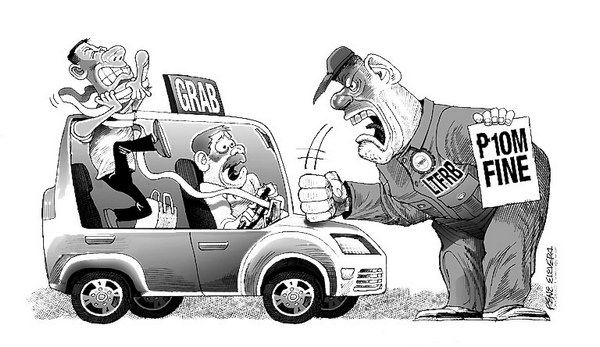An order by the Land Transportation Franchising and Regulatory Board (LTFRB) to transport network service Grab to pay a P10 million fine and provide rebates to its costumers should hopefully, however remote it may be, lead to a rollback of taxi rates.
But with the government’s TRAIN law and the unstable oil prices worldwide, taxi fare rates aren’t going anywhere but up as operators seek to compete with Grab and other transport network services for the consumer market.
It’s not so much the fare rates charged by Grab and transport network services but the P2 per minute waiting time addition on top of the existing rate that had caused fare rates to go unreasonably high.
This was the subject of the rebate required by LTFRB from Grab which complained that it will cause undue loss to its operators.
The P2 additional per minute had been copied by taxi operators on top of their fare rate increase in their belief that it would make them competitive with Grab and its former rival Uber.
Instead the additional P2 minute charge had made taxi and transport network services more expensive for the average commuter who is then forced to forego convenience for cheaper, yet uncomfortable mass transport like motorcycle-for-hire (habal habal) and passenger jeepneys.
The common excuse given by these operators is the traffic congestion which seems to have no end and solution in sight.
Though the national government pledged to undertake road projects and mass transport alternatives like the Bus Rapid Transit (BRT), this will take time and funding which is slow in coming.
In Cebu City for instance, the traffic congestion caused by the construction of the multi-billion peso underpass project at Natalio Bacalso had made life on the road a living hell for motorists but multiply their inconvenience several times on the commuter who will pay more than extra for taxis to reach their destination in the north.
To avoid paying more they content themselves with jeepney and habal-habal rides.
Imagine riding those public utility vehicles (PUVs) during hour-long traffic in the middle of an unusually warm day or a heavy downpour.
Which is why an affordable, yet comfortable mass transport option is seen as an effective, even if temporary solution to this traffic congestion. So what’s the holdup on the Bus Rapid Transit (BRT) project for Cebu City?
With the LRT still years away from implementation, can the LTFRB consider making taxi and transport network service rides more affordable to the majority of the riding public?
Disclaimer: The comments uploaded on this site do not necessarily represent or reflect the views of management and owner of Cebudailynews. We reserve the right to exclude comments that we deem to be inconsistent with our editorial standards.

